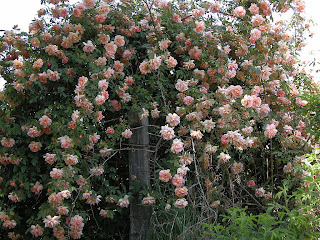I must confess you my love for giant roses! Now that my gardening grounds are reduced to next to nothing I realised that among all roses in the vast rose world, I truly have a passion for the ramblers and climbers that romp up to more than 10 meters...
The Banksias in all their forms, R. Filipes Kiftsgate, R. Cooperii they all make me weak.
Not that I despise the rest, I still love a lot of other roses, but nothing moves me like the vision of a whole tree or barn clothed in a cloud of blooms.
Giant rambler roses give you the real idea of how incredibly strong and resistant roses are! There is nothing frail and in need of pampering about them! In a couple of years they can literally swallow a garage (and I can only dream of them covering all hideous barns around), bury it under masses of petals and all this without the slightest care from the gardener. No pruning and tying needed there, the canes shoot up in the air and harpoon anything that crosses their way.
The first time I saw it was at the Villa Hanbury on the Ligurian coast in Italy. The villa in itself is worth the trip, since it is a marvellous place perched on the Mortola promontory above the sea and its botanical garden is charming.
The rose in question is called "Belle Portugaise" and is a climbing Hybrid Tea obtained by Henry Cayeux at the beginning of the XXth century.
Cayeux gives its parentage in Rosa Gigantea x R. Madame Léonie Vienot, though in many catalogues it is R. Gigantea x Reine Marie Henriette.
Now the Belle in question at La Mortola covers a pergola of 10 to 15 meters with a single plant! The blooms are rather big, loose with shell pink silky petals. The center is darker in colour and opens to silvery pink.
As you can see, the flowers are born on unusually long and thin stems which nod graciously as the blooms unfold and become heavier. The buds are particularly long and pointed matching the shape of the light green leaves. The whole plant appears graciously slender in spite of the impressive size.
Now Belle Portugaise was born at the Botanical Garden in Lisbon under the warm sun of Portugal. A daughter of the Rosa Gigantea and with Tea ancestors it is rather tender and not loving of cold climates. Maybe this is the reason it is virtually non existent in most rose catalogues of our days, apart from the most specialised ones. ( Peter Beals of course has it!!!) It is a pity since a Belle Portugaise in full bloom is a vision of absolute elegance.
pergola at Villa Hanbury in early March
Villa Hanbury, La Mortola
stairs covered bu pergola at Villa Hanbury
Villa Hanbury, view of the gardens
http://www.giardinihanbury.com








Anul trecut, la sfirsitul lui Aprilie, cind am vizitat gradinile, nu era inca inflorita. E minunata " Frumoasa Portugheza ". Si ne potrivim la gusturi ... dar si eu am o gradina mica.
ReplyDeleteDani e intotdeauna o placere sa vad ca ai "trecut" pe aici...
DeletePrzejść pod pergolą i zejść po schodach, gdzie nad głowa są takie śliczne róże, to prawdziwa przyjemność i radość. Pozdrawiam.*** Go under the pergola and down stairs, where the head is such beautiful roses, is a real pleasure and joy. Yours.
ReplyDeleteSuch a beautiful roses :)
ReplyDeletehttp://kolorywogrodzie.blog.onet.pl
Such a beautiful roses :)
ReplyDeletehttp://kolorywogrodzie.blog.onet.pl
I'm going to plant it!
ReplyDeleteoh, I beg your pardon: Her!
(I DO love giant roses too!)
Does anyone know where I can order the portuguese rose plant?
ReplyDeleteCottage was a late nineteenth-century ideal to return to the simple cottages of the country. They were planted with hardy bulbs, flowers, fruit bushes and herbs and vegetables. They were geometric, colours were harmonised and luxurious as plants grew well as they were heavily manured regularly. instalación y mantenimiento de jardines y zonas verdes
ReplyDelete